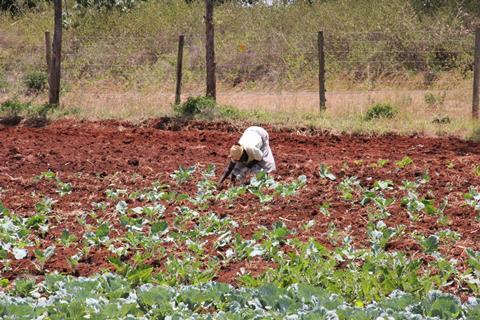The UN’s International Fund for Agricultural Development has warned that global food security is being jeopardised by a failure to act now
IFAD, the UN’s International Fund for Agricultural Development, has urged global leaders ahead of COP28 to urgently scale-up climate finance for small-scale farmers and small agribusinesses.

Climate finance for small-scale agrifood systems has fallen by 44 per cent since 2017/18, currently standing as low as 0.8 per cent of total climate finance, according to a report by the ClimateShot Investor Coalition (CLIC) and the Climate Policy Initiative (CPI).
“This trend is extremely worrying,” said IFAD president Alvaro Lario. “We are going in the wrong direction. Small-scale farmers, who feed entire communities and nations in the developing world, need to be able to adapt to climate change now. If they don’t, their lives and livelihoods - and global food security - are at risk.”
Small-scale farmers produce an estimated one-third of the world’s food and as much as 70 per cent of the food in low- and middle-income countries, many of which are facing severe impacts from climate change.
“Small-scale farmers are often on the climate frontlines, living in vulnerable areas, and exposed to extreme weather events,” IFAD stated. “Crop yields are predicted to fall by up to a quarter by the end of the century. In some cases, yields could drastically drop by up to 80 per cent as shown by case studies that IFAD commissioned in 2021. Many of the 3bn people living in the rural areas of developing counties rely to an important extend on small-scale farming for a living and for their food supply.”
Yet, instead of accelerating, investments are presently slowing down. “This is extremely disturbing as solutions to help small-scale farmers to adapt do exist,” said Lario. “We have the know-how and the technology, what we need are investments now.”
IFAD points to climate-resilient and low-emission irrigation systems and infrastructure as a solution well adapted to small-scale farming, as well as agroecology and agroforestry practices, better soil management practices and crop diversification.
“In addition, early-warning and climate information systems, as well as climate-proof infrastructures, such as food storage units and rural roads that withstand flooding are essential to prevent loss and damage,” IFAD added.
“Governments, finance institutions and the private sector all have a role to play to bring more finance to small-scale farming systems,” Lario concluded. “We must convert National Determined Contributions and National Adaptation Plans into investment plans with a pipeline of bankable projects, and deploy innovative financial instruments to de-risk and attract private investments. Investing in climate-smart, small-scale agriculture is good for the planet and is good for businesses.”



